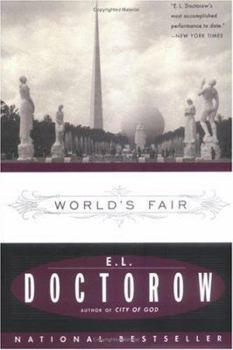World's Fair
Select Format
Select Condition 
Book Overview
Customer Reviews
Rated 5 starsHistorical fiction with a literary sensibility
Written ten years after Ragtime, Doctorow's World's Fair seems to be a far simpler book, primarily because it is all told from a single point of view, that adult Edgar looking back at his childhood and its significance. Doctorow, however, creates a complex picture of what it meant to be Jewish and growing up in the Bronx during the 1930's, a time when Americans struggled against the hardships of the Great Depression. Much...
0Report
Rated 5 starsSuch innocence!
This book was very hard to put down once I stared to read it. It's a simple story about a boy growing up in Depression era NYC. There's no real excitement or climax (well, maybe Edgar finally going to the World's Fair) but it is simply a story about a boy and the time he lived in. Wonderfully written.
0Report
Rated 5 starsA wistful novel of nostalgia
E.L. Doctorow is probably New York's greatest literary nostalgia artist. While "Ragtime" recalls the city's colorful population explosion of immigrants at the beginning of the twentieth century and "Billy Bathgate" is a boy's Depression-era underworld fantasy, "World's Fair" evokes what it might have been like to grow up in the Bronx in the 1930's. The narrator, Doctorow's voice and presumed alter ego, is a Jewish boy named...
0Report
Rated 5 starsA wonderful evocation of New York in the 1930's
We expect that Doctorow will use some piece of New York City's past as the setting for each of his novels but we also expect that he will give us a story with drama, tragedy or some wry take on the human comedy. In World's Fair he only gives us the view of time past. There is precious little story in this book. It deals with a young boy and his family during the 1930's and concerns itself mostly with ordinary life and the...
0Report
Rated 5 starsMasterful. Every word was carefully chosen.
This book was like a great painting. Sentences are like brush strokes. Each one creating light, texture and in totality, portraying a beautiful moment in time.Doctorow is a master. His research of New York around the time period when the World's Fair came through town is painstakingly accurate. He describes it all with such beauty, through a young boy's eyes. I hesitate to say much more other than I strongly urge anyone to...
1Report














